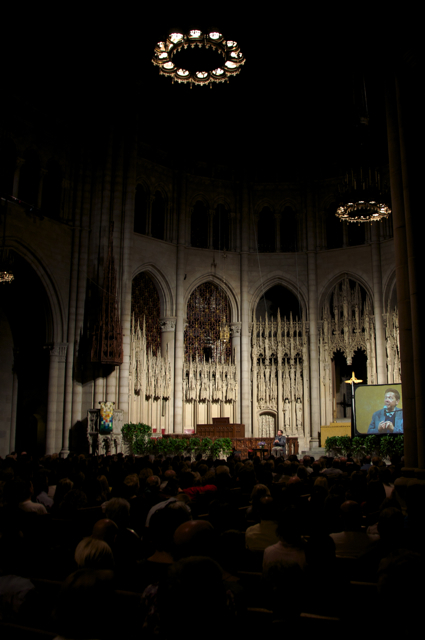
About 2,000 of us came together recently to hear Eckhart Tolle speak at the Riverside Church in Upper Manhattan. Tolle's books have sold over ten million copies, and include such bestsellers as "The Power of Now" and "A New Earth." It was a true New York City crowd, which included people from a range of vocations, from the editors of popular magazines to movie stars.
Tolle, who rarely does public appearances, spoke on a wide range of topics, particularly focusing on how we lose access to the present moment through identification with thinking.
As he wrote in A New Earth, the ego creates stories to "convince you that you cannot be at peace now or cannot be fully yourself now ... The ego says: Maybe at some point in the future I can be at peace -- if this, that, or the other happens, or I obtain this or become that. Or it says: I can never be at peace because of something that has happened to me in the past."
Going to dinner after the talk, a lively discussion arose between myself and a dear friend on the role of therapy and healing. The question at hand: If freedom can always be found in this moment, no matter the conditions present, should one simply accept that old wounds are present in oneself, or is it essential, as my friend argued, that one "work with a therapist and do practices that help to release old patterns of tension and holding in the mind and body?"
This discussion reflects a fierce debate between the"now" or non-dual crowd and those who favor therapy and self-help approaches. On the one side, lets call it the "surrender to what is crowd," it is the very idea that anything needs to change, that something is not right, that keeps us missing the inherent perfection that exists in every moment. Believing that if we just "process more," just "understand ourselves more," just "do more work on ourselves," we will at last achieve freedom, is exactly what makes us miss it.
The other side, lets call it the "work on yourself crowd," believes that there is in fact change that needs to happen; there are old wounds directing our lives in destructive ways, and it is only by facing and releasing these old patterns that we can live with greater freedom and joy. To not work on these old wounds and simply be with the moment as it is, is not acceptance ... it's delusion. There is work to do more than to simply "surrender to what is."
Are these really different paths?
However, as I engaged in this discussion with my friend, me sipping a glass of water and her a martini, what interested me the most was how much the debate triggered me. I argued impassionately for "surrendering to what is," at times my face turning red, jaw tightening, and chin protruding forward. While I tried to be somewhat careful with my words, the underlying response from my body was, "You are such an idiot. How can you not see that surrendering to what is, is the only path? If you just surrender to what is, you can be totally peaceful, accepting, and loving, like me!"
I argued for something I was oceans apart from experiencing in the moment. The irony was completely lost on me at the time.
And in this, we may find, the real challenge: the truth is not just in words, but in experience. Every day across the globe there are thousands, if not millions, of debates between friends, co-workers, and family on a wide range of topics, from political, social, and spiritual subjects... yet what is most important may not be "what" we are discussing, but "how" we are doing so.
To what extent do we feel we have a viewpoint to "defend," even if that viewpoint is that someone should not attach to viewpoints? Fortunately, there is a deeper intelligence we can access, an intelligence that is not in the realm of knowing but of Being. It is less about "what" we say and more about "the space" from which we say it.
When we are completely with the moment, we can be with "what is" and be open to any change that wants to happen. I found the following from an old audio of Tolle, which speaks to both the acceptance of, and the entering into, suffering:
"The acceptance of suffering is a journey into death. Facing deep suffering, allowing it to be, taking your attention into it, is to enter death consciously. When you have died this death, you realize that there is no death, and there is nothing to fear. Only the ego dies."
Soren Gordhamer is the author of "Wisdom 2.0" and organizer of the Wisdom 2.0 Conferences, which bring together staff from technology companies such as Twitter, Google, Facebook along with those from wisdom traditions to explore living with deeper purpose, presence, and wisdom in our modern lives. More information at: Wisdom 2.0 Conference
Photo Credit: Stefan Day. For more of his pictures from the Eckhart Tolle talk, click here.